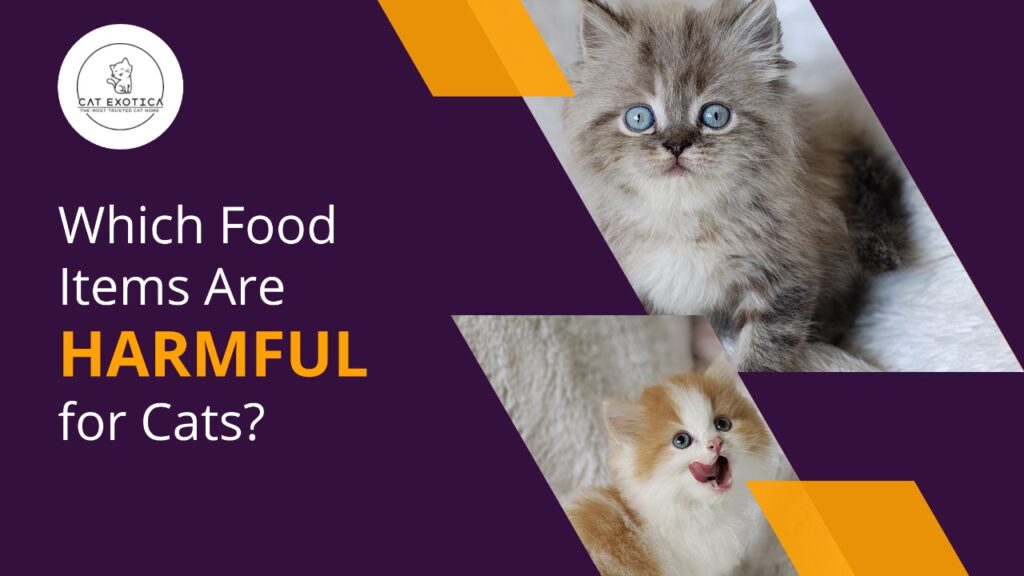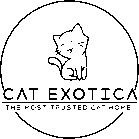Introduction
A cat is a curious creature who is often attracted by the smells and looks of human food. Cats have some similar dietary needs to humans, such as protein and water, but they have unique nutritional requirements, which make certain human foods unsafe for them. If you’re looking to buy cats and kittens for sale , it’s essential to understand their dietary needs to ensure a healthy and safe life. Feeding the wrong food can cause digestive issues, anemia, kidney failure, or even be life-threatening.
While some human foods may seem harmless to cats, they are obligate carnivores, which means their diet should be primarily meat-based. Their specially formulated cat food provides all the nutrients they need, and unnecessary human food can disrupt this balance. Here’s a comprehensive guide to the foods that are harmful to cats and how to protect your feline friend.

Chocolate: Sweet but Dangerous
Chocolate has caffeine and theobromine, which can be extremely dangerous for cats. Ingesting even a small amount can cause vomiting, diarrhea, hyperactivity, tremors, seizures, and in severe cases, death. Dark chocolate is especially dangerous due to its high bromine content. If your cat gets curious near a chocolate dessert, it’s crucial to prevent access immediately.
Tip : Always store chocolate out of your cat’s reach and educate everyone in the household about its risks. Even sharing a bite “just once” can have serious consequences.
Onions and Garlic: Silent Threats
Onions and garlic contain thiosulphates, compounds that can damage a cat’s red blood cells and lead to anemia. Symptoms of poisoning may include weakness, lethargy, pale gums, and a reduced appetite. Both raw and cooked forms can be toxic, so it’s best to avoid feeding your cat any dish containing these ingredients.
For those who choose to buy cats and kittens for sale , knowing which foods to avoid can save you a lot of stress and ensure your new pet lives in a safe environment.
Grapes, Raisins, and Avocado: Kidney Risks
Grapes and raisins carry an unknown toxin that can lead to acute kidney failure in cats. Signs include vomiting, diarrhea, and lethargy. Similarly, avocado contains persin, which can cause gastrointestinal distress. Although small amounts may not always be fatal, the risk is high enough that it’s best to keep these foods completely out of your cat’s diet.
Cats are particularly sensitive to new or unusual foods, so maintaining a stable, cat-friendly diet is always safe.
Alcohol, Coffee, and Tea: No Caffeine or Spirits
Alcohol and caffeinated beverages like coffee and tea are extremely dangerous for cats. Even small amounts can result in vomiting, a rapid heart rate, tremors, or worse. Alcohol may lead to a coma or death, while caffeine can cause severe neurological and cardiovascular issues. Keep all drinks and spirits stored securely to prevent accidental ingestion.
Dairy and Cooked Bones: Common Mistakes
While cats may enjoy milk, many are lactose-intolerant. Feeding dairy products can cause diarrhea, vomiting, and other digestive issues. Cooked bones, often seen as treats, can splinter and lead to choking, internal blockages, or tears in the digestive tract. Always provide safe alternatives, such as cat-specific treats or chewing toys.
Reminder : If your cat shows symptoms of poisoning, including vomiting, diarrhea, or lethargy, seek veterinary care immediately. Prompt attention can save your pet’s life.
Preventing Accidental Poisoning
Preventing exposure to harmful foods is the best way to keep your cat safe. Here are some key tips.
- Stick to nutritionally complete cat food and avoid feeding table scraps.
- Store all human food securely in cabinets or containers .
- Keep counters and tables clear to prevent cats from jumping up for treats.
- Dispose of leftovers properly to avoid scavenging.
- Educate family members and guests on foods your cat should avoid.
- Offer smaller, frequent meals to reduce food-seeking behavior.
- Offer engaging toys and scratching posts to keep your cat mentally and physically active.
Implementing these practices can significantly reduce the risk of accidental poisoning and help your cat maintain good health.
Do’s and Don’ts if Your Cat Eats Something Toxic
Do :
- Remain calm and carefully evaluate what your cat may have ingested.
- Reach out to a veterinarian or a pet poison helpline right away for guidance.
- Remove toxic items from your cat’s environment .
- Provide detailed information about what was ingested.
- Follow professional guidance for treatment and monitoring.
Do :
- Avoid inducing vomiting unless instructed by a professional.
- Never give medications without veterinary advice.
- Don’t delay seeking help. Getting immediate care is critical.
Conclusion
Understanding which foods are harmful to cats is essential for every pet owner. Foods like chocolate, onions, grapes, alcohol, and even some dairy products can have serious or fatal consequences. If you’re planning to buy cats and kittens for sale , informing yourself of this knowledge ensures your new feline companion remains healthy and safe. Always provide a balanced diet, store human foods securely, and monitor your cat’s behavior closely to prevent the accidental ingestion of toxic items. A little awareness goes a long way to keeping your furry friend happy and healthy.
